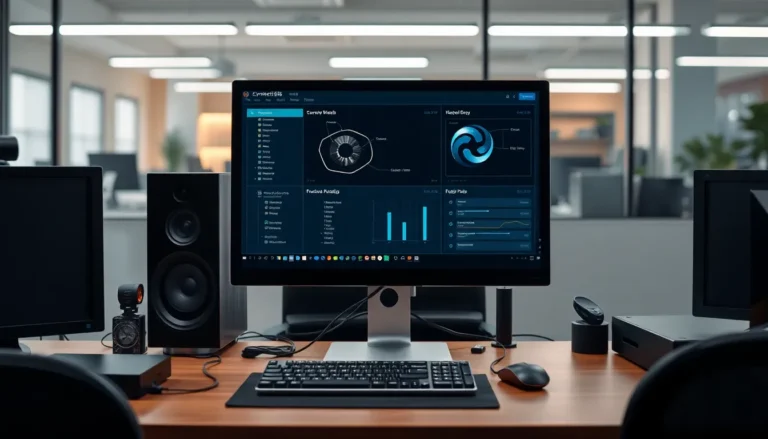Table of Contents
ToggleIn the fast-paced world of biotechnology, finding the right talent can feel like searching for a needle in a haystack—if that haystack were made of lab coats and petri dishes. Enter biotech recruiters, the unsung heroes of the industry, armed with a keen eye for talent and a knack for matching the right scientists to the right projects. They don’t just fill positions; they build dream teams that can turn groundbreaking ideas into reality.
Overview of Biotech Recruiters
Biotech recruiters play a vital role in the biotechnology landscape. These professionals specialize in identifying talent within the scientific community. They possess extensive knowledge of various biotech sectors, which allows them to pinpoint the right candidates for specific needs.
Matching candidates to positions involves understanding both the skills of a scientist and the requirements of the role. This understanding helps recruiters build effective teams capable of driving innovation. Effective recruiters also maintain relationships with industry leaders, keeping them informed about emerging trends in biotechnology.
In addition to facilitating hires, biotech recruiters offer valuable insights into candidate market trends. Their expertise helps companies anticipate staffing needs and adjust recruitment strategies accordingly. Many of these recruiters utilize advanced technologies and networks to streamline the hiring process.
Biotech recruiters often focus on sectors such as pharmaceuticals, medical devices, and research organizations. By engaging with diverse sectors, they broaden their talent pool. This perspective enhances their ability to match candidates with projects that align with their expertise and career aspirations.
Strategic partnerships form another key element of the recruiters’ role. Collaborating with educational institutions, they tap into new graduate talent while reinforcing industry connections. Ultimately, biotech recruiters contribute significantly to successful project execution and the advancement of biotechnology innovations.
Importance of Biotech Recruiters

Biotech recruiters play an essential role in aligning skilled scientists with projects in the biotechnology sector. Their expertise streamlines hiring processes and supports industry growth.
Industry Knowledge
Industry knowledge sets biotech recruiters apart from generalist recruiters. They possess a deep understanding of the unique skills and qualifications required for various roles in biotechnology. This familiarity with scientific disciplines allows them to evaluate candidates effectively. Additionally, recruiters stay updated on industry trends and advancements, enhancing their ability to meet the evolving needs of biotech firms. In turn, they assist companies in making informed hiring decisions that drive success.
Network of Professionals
A robust network of professionals is another key advantage biotech recruiters offer. Recruiters build relationships with industry leaders, scientists, and hiring managers, ensuring they remain informed on candidate availability and emerging talent. This extensive network provides access to passive candidates, those not actively seeking jobs but open to new opportunities. By leveraging these connections, recruiters can present clients with a diverse talent pool. Ultimately, this network facilitates quicker and more accurate placements, supporting innovation within the biotechnology field.
Services Offered by Biotech Recruiters
Biotech recruiters deliver specialized services tailored to the unique demands of the biotechnology industry.
Candidate Sourcing
Candidate sourcing involves identifying and attracting top talent. Recruiters utilize diverse channels, from job boards to social media, to locate qualified scientists. They leverage their industry connections, continually engaging with professionals. Assessing skill sets and cultural fit ensures that they present suitable candidates for each role. By focusing on both active and passive candidates, biotech recruiters broaden the talent pool and enhance placement success rates.
Market Analysis
Market analysis plays a vital role in recruitment strategies. Recruiters monitor industry trends, salary benchmarks, and skill demand fluctuations regularly. They gather insights from market research and competitor analysis to inform clients. Understanding regional and global shifts in the biotechnology landscape equips recruiters with valuable data. This information aids biotech firms in planning their hiring strategies and anticipating future workforce needs.
How to Choose the Right Biotech Recruiter
Selecting a biotech recruiter requires careful consideration of specific qualities that align with hiring goals. Evaluating these factors enhances the recruitment process and increases the likelihood of finding the right talent.
Key Factors to Consider
Industry expertise stands out among important factors. Recruiters familiar with biotech trends and job requirements understand nuances in roles like research scientists, regulatory affairs specialists, and clinical project managers. Network strength plays a crucial role as well; a well-connected recruiter can access passive candidates who may not be actively seeking new positions. Additionally, look for recruiters with a history of successful placements in similar companies or fields. Alignment with company values significantly improves team cohesion and ensures a smooth cultural fit.
Questions to Ask
When interviewing potential recruiters, ask about their experience in the biotech industry. Determine how they source candidates and which methods they find most effective. Inquire about their approach to evaluating candidates’ skills and qualifications. Clarify how they maintain their network and keep up with industry trends. Seek insights into their experience with roles specific to your organization’s needs. Understanding their timeline for filling positions and their support during the onboarding process is essential.
Biotech recruiters play a pivotal role in shaping the future of the biotechnology industry. Their specialized knowledge and extensive networks empower them to connect talented scientists with the right opportunities. By understanding the unique demands of various roles and maintaining relationships with industry leaders, they ensure companies have access to the best candidates.
Their strategic approach to recruitment not only fills positions but also fosters innovation and collaboration within teams. As the biotech landscape continues to evolve, the importance of skilled recruiters will only grow, making them indispensable partners for companies aiming to stay ahead in this competitive field.







